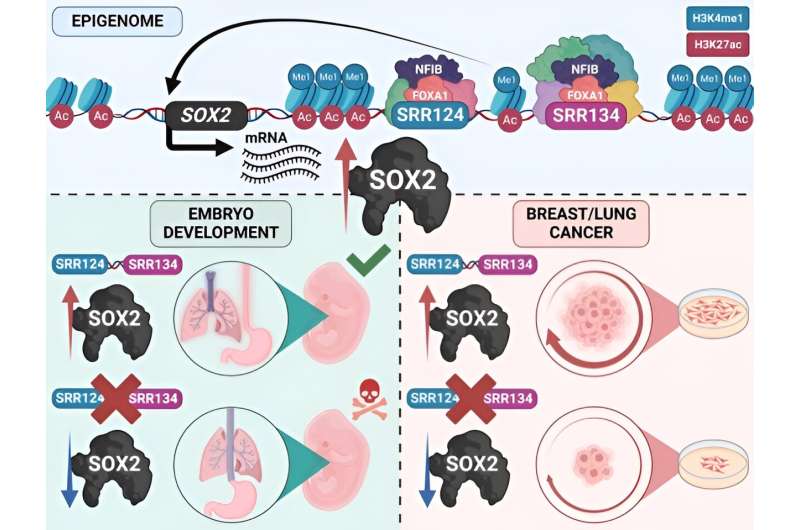This article has been reviewed according to Science X's editorial process and policies. Editors have highlighted the following attributes while ensuring the content's credibility:
fact-checked
peer-reviewed publication
trusted source
proofread
Researchers find a cancer enhancer in the genome that drives tumor cell growth

University of Toronto (U of T) researchers have found that cancer cells can enhance tumor growth by hijacking enhancer DNA normally used when tissues and organs are formed. The mechanism, called enhancer reprogramming, occurs in bladder, uterine, breast and lung cancer, and could cause these types of tumors to grow faster in patients.
Published in the journal Nucleic Acids Research, the results also pinpoint the role that specific proteins play in regulating the enhancer region which may lead to improved treatments for these cancer types.
Living cells, even cancer cells, follow instructions in the genome to turn genes on and off in different contexts.
"The genome is like a recipe book written in DNA that gives instructions on making all the parts of the body," says first author Luis Abatti, who obtained his Ph.D. in the Department of Cell & Systems Biology at U of T.
"In each organ, only the recipes relevant to that organ should be followed, whether it's the instructions for lung, breast or some other tissue. Like flipping pages in a recipe book, the DNA containing the instructions for turning genes on in the lung is open and used in the lung, for example, but closed and ignored in other types of cells."
"We know that some cancer cells are opening the wrong pages in the recipe book—ones that contain the SOX2 gene, which can cause tumors to grow uncontrollably. We wanted to find out: how does the gene become expressed in cancer cells?"
The researchers analyzed genome data to look for enhancer DNA that could activate SOX2 in cancer cells. The enhancer they found is open in many different types of patient tumors, meaning this could be a cancer enhancer active in bladder, uterus, breast and lung tumors. Unlike many cancer-causing changes, this enhancer reprogramming mechanism does not arise out of mutation due to DNA damage; it is caused by part of the genome opening when it should be staying closed.
The researchers then determined that the enhancer causes increased cancer cell growth because when they removed the enhancer in lab-grown cells, the cancer cells created fewer new tumor colonies.
To figure out why cells have a DNA region that makes cancer worse, the team generated mice without this DNA region, and found these mice do not form a separate passage for air and food in their throat as they develop. Thus, this potentially dangerous cancer-enhancer region is likely in the human genome to regulate airway formation as the human body forms. However, if a developing cancer cell opens this region, it will form a tumor that grows faster and is more dangerous for the patient.
"We also found that two proteins known to have a role in the developing airways, FOXA1 and NFIB, are now regulating SOX2 in breast cancer," says senior author Jennifer Mitchell, professor in the Department of Cell & Systems Biology at U of T.
The enhancer is activated by the FOXA1 protein and suppressed by the NFIB protein. This means that drugs suppressing FOXA1 or activating NFIB may lead to improved treatments for bladder, uterine, breast and lung cancer.
"Now that we know how the SOX2 gene is activated in certain types of cancers, we can look at why this is happening," says Mitchell. "Why did the cancer cells end up on the wrong page of the genome recipe book?"
More information: Luis E Abatti et al, Epigenetic reprogramming of a distal developmental enhancer cluster drives SOX2 overexpression in breast and lung adenocarcinoma, Nucleic Acids Research (2023). DOI: 10.1093/nar/gkad734



















